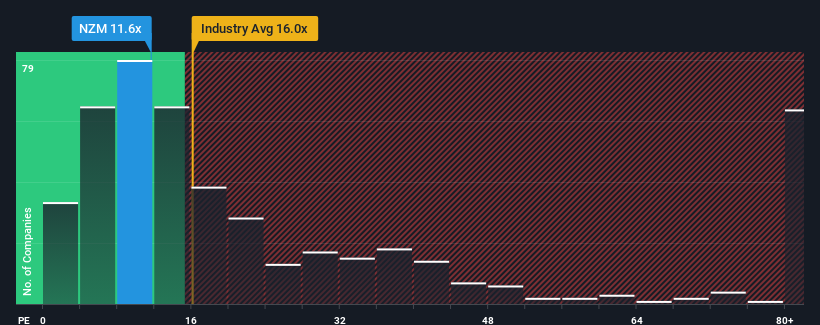- New Zealand
- /
- Media
- /
- NZSE:NZM
Improved Earnings Required Before NZME Limited (NZSE:NZM) Stock's 27% Jump Looks Justified

NZME Limited (NZSE:NZM) shareholders would be excited to see that the share price has had a great month, posting a 27% gain and recovering from prior weakness. The bad news is that even after the stocks recovery in the last 30 days, shareholders are still underwater by about 6.1% over the last year.
In spite of the firm bounce in price, NZME's price-to-earnings (or "P/E") ratio of 11.6x might still make it look like a buy right now compared to the market in New Zealand, where around half of the companies have P/E ratios above 16x and even P/E's above 31x are quite common. However, the P/E might be low for a reason and it requires further investigation to determine if it's justified.
Recent times haven't been advantageous for NZME as its earnings have been falling quicker than most other companies. It seems that many are expecting the dismal earnings performance to persist, which has repressed the P/E. If you still like the company, you'd want its earnings trajectory to turn around before making any decisions. Or at the very least, you'd be hoping the earnings slide doesn't get any worse if your plan is to pick up some stock while it's out of favour.
Check out our latest analysis for NZME

How Is NZME's Growth Trending?
There's an inherent assumption that a company should underperform the market for P/E ratios like NZME's to be considered reasonable.
Retrospectively, the last year delivered a frustrating 51% decrease to the company's bottom line. Unfortunately, that's brought it right back to where it started three years ago with EPS growth being virtually non-existent overall during that time. Therefore, it's fair to say that earnings growth has been inconsistent recently for the company.
Shifting to the future, estimates from the two analysts covering the company suggest earnings should grow by 5.7% per annum over the next three years. With the market predicted to deliver 21% growth per annum, the company is positioned for a weaker earnings result.
With this information, we can see why NZME is trading at a P/E lower than the market. Apparently many shareholders weren't comfortable holding on while the company is potentially eyeing a less prosperous future.
What We Can Learn From NZME's P/E?
Despite NZME's shares building up a head of steam, its P/E still lags most other companies. Using the price-to-earnings ratio alone to determine if you should sell your stock isn't sensible, however it can be a practical guide to the company's future prospects.
As we suspected, our examination of NZME's analyst forecasts revealed that its inferior earnings outlook is contributing to its low P/E. Right now shareholders are accepting the low P/E as they concede future earnings probably won't provide any pleasant surprises. Unless these conditions improve, they will continue to form a barrier for the share price around these levels.
It's always necessary to consider the ever-present spectre of investment risk. We've identified 3 warning signs with NZME, and understanding these should be part of your investment process.
Of course, you might find a fantastic investment by looking at a few good candidates. So take a peek at this free list of companies with a strong growth track record, trading on a low P/E.
Valuation is complex, but we're here to simplify it.
Discover if NZME might be undervalued or overvalued with our detailed analysis, featuring fair value estimates, potential risks, dividends, insider trades, and its financial condition.
Access Free AnalysisHave feedback on this article? Concerned about the content? Get in touch with us directly. Alternatively, email editorial-team (at) simplywallst.com.
This article by Simply Wall St is general in nature. We provide commentary based on historical data and analyst forecasts only using an unbiased methodology and our articles are not intended to be financial advice. It does not constitute a recommendation to buy or sell any stock, and does not take account of your objectives, or your financial situation. We aim to bring you long-term focused analysis driven by fundamental data. Note that our analysis may not factor in the latest price-sensitive company announcements or qualitative material. Simply Wall St has no position in any stocks mentioned.
About NZSE:NZM
NZME
Engages in the integrated media and entertainment business in New Zealand.
Good value with reasonable growth potential.
Similar Companies
Market Insights
Community Narratives



